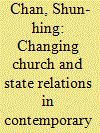| Srl | Item |
| 1 |
ID:
116489


|
|
|
|
|
| Publication |
2012.
|
| Summary/Abstract |
This study examines church-state relations in Mindong diocese, Fujian province, from the perspective of state-society relations. The article seeks to identify the salient patterns of church-state relations in Mindong diocese, and the social factors that contribute to the formation of such patterns. I elaborate on the essential characteristics of the Mindong model in the paper. I argue that the three key factors affecting church-state relations in Mindong diocese are the competition between the open and underground churches, the mediating role of the Vatican, and the pragmatism of local government officials. I describe the Mindong model as a "negotiated resistance," meaning that the underground church resists the control of the government and seeks organizational autonomy through continued negotiation with officials of the government. In conclusion, I discuss the implications of this church-state model in advancing religious freedom in Chinese society.
|
|
|
|
|
|
|
|
|
|
|
|
|
|
|
|
| 2 |
ID:
183802


|
|
|
|
|
| Summary/Abstract |
This study examines the effects of the mainline Protestant churches' influence on their church members' political opinions in Hong Kong using Paul Djupe and Christopher Gilbert's theory of church-centered influence on political behavior. The contextual factors of the theory are formal and informal social networks, church environment, and orienting forces, while the individual factors are personal attributes and religious resources. The findings show that social networks had a strong influence on the church members' sense of issue importance, whereas church environment had a moderate influence on its members. Orienting forces had almost no effect on the church members' political opinions, while personal attributes and religious resources showed modest effects on certain issues, but not consistently across issues.
|
|
|
|
|
|
|
|
|
|
|
|
|
|
|
|